

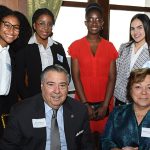
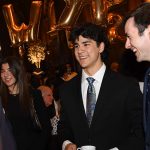




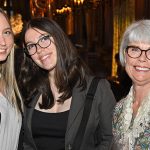
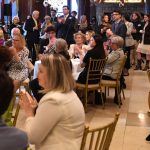
 On April 24, hundreds of members of the Fordham community came together to celebrate the impact of scholarships—which have, for some recipients, meant everything.
On April 24, hundreds of members of the Fordham community came together to celebrate the impact of scholarships—which have, for some recipients, meant everything.
“These are more than scholarships,” said Fordham senior Sonola Burrja, giving an address at the University’s annual Scholarship Donors and Recipients Reception. “They are often life-changing events that have aided us in becoming who we are today.”
Burrja, who emigrated from Albania, got a scholarship at a time when she was afraid she wouldn’t be able to finish her degree at Fordham. Now she’s sitting on three medical school acceptances. “This scholarship truly changed the path that my life is about to take,” said Burrja, a biological sciences major at Fordham College at Rose Hill and recipient of the Eugenie F. Doyle, M.D., and Joseph A. Doyle, Esq., Endowed Scholarship.
The event at the University Club in Manhattan drew approximately 340 donors and students—some of whom were meeting the benefactors behind their scholarships in person for the first time.
Others already had relationships with their benefactors. One recipient in attendance, Gabriella Lopez, was considering transferring to a college back home in Florida a few years ago because of how the coronavirus pandemic shook up her family’s dynamics. She thought it would be impossible for her to come back to Fordham, “which really did sadden me tremendously,” she said. “I had already spent a year and a half here, and I wanted to stay committed and finish out my degree.”
Then Fordham connected Lopez to a scholarship created by Patricia Dugan-Perlmuth, FCLC ’79. “That basically just saved me and gave me the opportunity to finish out my career here at Fordham,” said Lopez, now a senior in the Ailey/Fordham BFA in Dance program at Fordham College at Lincoln Center. In addition to the scholarship gift, Dugan-Perlmuth’s “consistent communication with me has really helped keep me steady and grounded and graduate on time.”
To Dugan-Perlmuth, that’s just part of giving to Fordham. “It’s very cura personalis,” she said, using the Jesuit term for caring for the whole person.
The Cycle of Giving
In her own remarks, Tania Tetlow, president of Fordham, spoke of the cycle of scholarship giving and lauded the commitment of donors. “I’ve met so many of you, both in New York and around the country, and you tell me these stories—sometimes with tears in your eyes—about what it meant to have someone invest in you,” she said, “and how eager you are to keep investing in others.”
The night was full of stories of trials and triumph as students and donors sat together around tables, breaking bread. “It’s exhilarating to put a face to the name,” said Theresa Krembs, a sophomore at Fordham College at Lincoln Center and another recipient of Dugan-Perlmuth’s endowed scholarship.
Two donors also addressed the gathering—Mary Jane F. McCartney, TMC ’69, PAR, and her husband, George F. McCartney, Esq., FCRH ’68, LAW ’74, PAR, both of whom are longtime members of the Fordham University President’s Council. “To achieve our hopes for you, it’s important that you do more than graduate and get a good-paying job,” Mary Jane McCartney said. “We hope that you are spending your time here absorbing the full range of cultures, ideas, and viewpoints that an intense Jesuit education provides.”
One student in attendance, Kweku Andoh Jr., a sophomore in the Gabelli School of Business, came to Fordham to learn the business side of fashion and get experience in the industry, and is now doing shoots and working at Moschino, a fashion house. But he might not be at Fordham without the Richard R. Hayes, GABELLI ’51, Endowed Scholarship, designated for veterans and students from military families.
Andoh is the son of a federal employee and member of the U.S. Army; the family was relocating from a duty station in Germany around the time he entered Fordham, and needed help with his tuition. The scholarship “is really great, tailored to students like me, who have parents in the military,” Andoh said. “I think the scholarship has really helped with our transition.”
Richard Hayes, founder of the scholarship, passed away in 2018, but his wife, Margaret Hayes, came to the reception and met Andoh there. She said hearing recipients’ stories and connecting with students who have lived all over the world keep her coming back.
“They’re just so lovely and energetic and hopeful and creative,” she said. “I come every year.”
— Jeff Coltin
Scholarship gifts advance the University’s current $350 million fundraising campaign, Cura Personalis | For Every Fordham Student. Learn more about our campaign.
]]>His acceptance was especially joyous for his parents, neither of whom had been able to go to college. Later, when he brought them to the Rose Hill campus, “you could see how proud they were that I was going there. And I felt exactly the same way,” he said. “So I developed a love for Fordham that never left me.”
That love stayed in the background during the busy decades following his 1969 graduation from Fordham College at Rose Hill as an English major. Within two years he was a newly married father of twins. He went into banking, earning an MBA from Pace University at night, and built a successful executive career at firms including American Express; Black Rock Capital, which he co-founded; and Cannon Capital Ltd.
Over the past few decades, he has come back to Fordham in a number of roles: He is a longtime trustee and former member of the President’s Council who has often visited Fordham classrooms and spoken at student-focused University events. He was an advisory board member for Fordham’s programs in London, where he and his family lived for 20 years. He is a 2011 recipient of the Fordham Founder’s Award, and he is also a Fordham parent—of the four children born to him and his late wife, Jane M. Flaherty, two are Fordham graduates.He is also a generous donor to the University. Among their other gifts to Fordham, he and Jane established two scholarship funds: one named for Roy E. Haviland, GABELLI ’69, a Navy pilot and classmate of Jim’s who was killed in a midair collision off the coast of North Vietnam in 1973, and one named for Jane Flaherty, to which he is making a new contribution. Jim serves on the committee for Fordham’s current campaign, Cura Personalis | For Every Fordham Student, which seeks to raise $350 million for priorities including access and affordability.
Those were always key priorities for the Flahertys—as an undergraduate, Jim faced financial challenges that nearly derailed his Fordham education. His own struggles informed the Flahertys’ commitment to giving scholarship support to students who, by now, number in the dozens.
Who is someone at Fordham who made a difference for you?
Father George McMahon [former dean of Fordham College at Rose Hill and namesake of McMahon Hall on the Lincoln Center campus]probably had the biggest impact on me when I met with him in junior year. I had ripped my knee up playing baseball at Fordham and had withdrawn from school for a semester, which was exciting because it meant I lost all my scholarships. Then my father had a stroke when I was beginning my junior year. I had to really juggle things around—because I didn’t have much money and because one parent was no longer able to work, I went to work on Wall Street, at the Bank of New York, running a collating machine that processed mutual fund statements.
And so I had to go see Father McMahon to talk about things, and he did me a world of good. I didn’t think I was going to be able to stay at the University, but he did all sorts of things for me that let me hold on to my scholarships, and he also let me fit classes into my work schedule. He went out of his way to make sure that I stayed in school, and I wound up, fortunately, graduating on time.
How did your undergraduate experience impact your giving?
My last two years at Fordham were a bit of a blur—I worked from midnight to eight o’clock in the morning, came up to Rose Hill, did my classes, went home to Brooklyn, slept for four hours, and then went back to Wall Street and worked from midnight until eight o’clock again. So it wasn’t exactly the kind of educational experience I think you’d want anybody to have. I don’t want anybody to ever have to go to Fordham the way I did.
My wife, Jane, also wanted us to support Fordham, for two reasons: Neither she nor any of her four brothers got to go to college, because their parents couldn’t afford for any of them to go. Also, she watched how hard it was for me, although she was extraordinarily supportive of what I was trying to do.
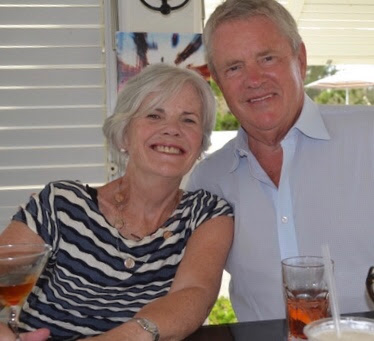
You once said she loved Fordham even more than you did. Can you elaborate?
When I was at Fordham, she was with me up on the campus every weekend, going to basketball games, all sorts of things. She had a college experience in a vicarious way, and she just loved every minute of it. In the years after I graduated, she was at Fordham fairly often with me, and then when we moved back from England, we were busy with Fordham things quite a bit.
By the way, when I was asked to go on the Board of Trustees by [Joseph M. McShane, S.J., president of Fordham], I said no, for a variety of reasons. Well, if you know Father McShane, you know he doesn’t give up. So he kept asking—I’m on the phone with him, in a car with Jane, having just landed in London, and I’m saying no, and there are pauses, and Jane finally said, “What’s this all about? Give me the phone.” So I handed her the phone and Father said he wanted me to go on the board. “Oh, OK,” she said. “He’ll do that.” End of story!
What was it like meeting your scholarship recipients at Fordham’s annual Scholarship Donors and Recipients Reception?
Our scholarship recipients would show up, and my wife would sit down with them all around a table. She treated them like their mother—urging them to eat something, asking how things were going for them. Like me, they were enthralled by her. Some of them would tell her they would never have been able to come to Fordham if they didn’t have the scholarship that she gave them. In some respects, it was a little bit like repeating my history. There was one young man whose father had died two months after his acceptance to Fordham. He was a policeman who had been killed. And it was a real question, whether this young man was going to be able to attend. And so every year for four years, he’d be the first one of the scholarship recipients in the room so he could have a private conversation with Jane. When he was a senior, his mother came, and that was a pretty tearful meeting. But yes, we had several students thank us.
Roy Haviland’s sister, Dorene Prinzo, still comes to the scholarship reception every year. He was my best friend at Fordham. Who, by the way, just to make it clear, my wife had a terrible crush on before she even agreed to talk to me.
Do you have advice for today’s graduates?
I’ve told students that they had better like what they do for a living and like the people they do it with. It would be better to quit their job than to do a job they hated, because it would become obvious that they hated what they were doing, and that kind of spills over as you go look for different jobs. If you’re doing something you don’t like to do, sooner or later, you’re going to do a bad job at it.
Is there a book that had a lasting influence on you?
There are two books, and the first is The Power and the Glory. It’s a novel by Graham Greene about a Catholic priest during the repression of the church in Mexico in the 1930s, and it shows what happens if you have the intestinal fortitude to do the right things. The other book is The Wall, by John Hersey, and it’s about the ghetto in Warsaw, Poland, in World War II, and how the Poles had to outwit the Nazis simply to survive. I went to Warsaw with my oldest son, and we saw the train station where they made the Jews get on the train to the concentration camps. He still talks about that. The Wall has stuck with me forever. I have a copy of it on my nightstand.
What are you optimistic about?
I am an optimist because America’s still far and away the greatest nation in the world. I think Americans will survive and thrive on the opportunities that America creates time and time again for its citizens. I am a believer in the movement toward diversity that’s underway, and Fordham’s history is all about diversity and opportunity—we were created in 1841 because Catholics couldn’t go to university.
What’s the best piece of advice you ever received?
My Irish Catholic mother, who doted on her only child, said, “You should marry that girl as soon as she’ll have you,” referring to Jane. Fundamentally, the most important decision I ever made was to marry my wife, and I did that in part because my mother told me to.
Jane M. Flaherty died peacefully on February 4, 2019, after an illness. On December 16, 2019, the University posthumously awarded her the Fordham Founder’s Award, noting, among other things, her dedication to the cause of Catholic education, her generosity of spirit, and the opportunities she created for the students of Fordham.
Learn more about the story behind the Roy E. Haviland Endowed Dean’s Scholarship Fund.
To inquire about supporting scholarships and financial aid or another area of the University, please contact Michael Boyd, senior associate vice president for development and university relations, at 212-636-6525 or [email protected]. Learn more about Cura Personalis | For Every Fordham Student, a campaign to reinvest in every aspect of the Fordham student experience.
]]>